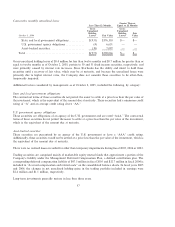Starbucks 2005 Annual Report Download - page 54
Download and view the complete annual report
Please find page 54 of the 2005 Starbucks annual report below. You can navigate through the pages in the report by either clicking on the pages listed below, or by using the keyword search tool below to find specific information within the annual report.Recent Accounting Pronouncements
In November 2005, the FASB issued Staff Position No. FAS 115-1, ""The Meaning of Other-Than-
Temporary Impairment and Its Application to Certain Investments'' (""FSP 115-1''). FSP 115-1 provides
accounting guidance for identifying and recognizing other-than-temporary impairments of debt and equity
securities, as well as cost method investments in addition to disclosure requirements. FSP 115-1 is effective for
reporting periods beginning after December 15, 2005, and earlier application is permitted. The Company has
adopted this new pronouncement in its fourth quarter of fiscal 2005. The adoption of FSP 115-1 did not have
an impact on the Company's consolidated financial statements. The required disclosures are presented in
Notes 4 and 7 of this Report.
In March 2005, the FASB issued Interpretation No. 47, ""Accounting for Conditional Asset Retirement
Obligations, an interpretation of FASB Statement No. 143'' (""FIN 47''). FIN 47 requires the recognition of a
liability for the fair value of a legally-required conditional asset retirement obligation when incurred, if the
liability's fair value can be reasonably estimated. FIN 47 also clarifies when an entity would have sufficient
information to reasonably estimate the fair value of an asset retirement obligation. FIN 47 is effective for
fiscal years ending after December 15, 2005, or no later than Starbucks fiscal fourth quarter of 2006. The
Company has not yet determined the impact of adoption on its consolidated statement of earnings and balance
sheet.
In December 2004, the FASB issued SFAS 123R, a revision of SFAS 123. SFAS 123R will require Starbucks
to, among other things, measure all employee stock-based compensation awards using a fair value method and
record the expense in the Company's consolidated financial statements. The provisions of SFAS 123R, as
amended by SEC Staff Accounting Bulletin No. 107, ""Share-Based Payment,'' are effective no later than the
beginning of the next fiscal year that begins after June 15, 2005. Starbucks will adopt the new requirements
using the modified prospective transition method in its first fiscal quarter of 2006, which ends January 1, 2006.
In addition to the recognition of expense in the financial statements, under SFAS 123R, any excess tax
benefits received upon exercise of options will be presented as a financing activity inflow rather than as an
adjustment of operating activity as currently presented. Based on its current analysis and information,
management has determined that the impact of adopting SFAS 123R will result in a material reduction of net
earnings and diluted earnings per share.
In December 2004, the FASB issued Staff Position No. FAS 109-1, ""Application of SFAS No. 109,
Accounting for Income Taxes, to the Tax Deduction on Qualified Production Activities provided by the
American Jobs Creation Act of 2004'' (""FSP 109-1''). FSP 109-1 states that qualified domestic production
activities should be accounted for as a special deduction under SFAS No. 109, ""Accounting for Income
Taxes,'' and not be treated as a rate reduction. The provisions of FSP 109-1 are effective immediately. The
Company will qualify for a benefit beginning in fiscal 2006, which is not expected to be material to the
Company's consolidated financial statements.
In December 2004, the FASB issued Staff Position No. FAS 109-2, ""Accounting and Disclosure Guidance
for the Foreign Earnings Repatriation Provision within the American Jobs Creation Act of 2004''
(""FSP 109-2''). The American Jobs Creation Act allows a special one-time dividends received deduction on
the repatriation of certain foreign earnings to a U.S. taxpayer (repatriation provision), provided certain criteria
are met. The law allows the Company to make an election to repatriate earnings through fiscal 2006.
FSP 109-2 provides accounting and disclosure guidance for the repatriation provision. Although FSP 109-2
was effective upon its issuance, it allows companies additional time beyond the enactment date to evaluate the
effects of the provision on its plan for investment or repatriation of unremitted foreign earnings. The Company
continues to evaluate the impact of the new Act to determine whether it will repatriate foreign earnings and
the impact, if any, this pronouncement will have on its consolidated financial statements. As of October 2,
52
























